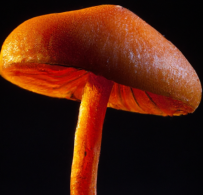Amazon has recently become a hub for AI-generated publications, including books on foraging, sparking concerns about potential fatal consequences. Mushroom enthusiasts are being warned against relying on mushroom foraging guides available on Amazon, suspected to be written by artificial intelligence (AI) chatbots. These AI-authored guides, masquerading as human-authored works, have raised suspicions due to their deceptive content. Originality.ai, a company specializing in identifying AI-generated content, conducted an examination of four book samples and found that they were likely written by chatbots. Excerpts from these books contain phrases that could lead to dangerous consequences, as they suggest using sensory experiences to identify mushrooms. Experts have criticized these guides, emphasizing the importance of choosing books from reputable sources. The discovery of these AI-authored guides has prompted an investigation by Amazon, who expressed their commitment to providing a safe shopping and reading experience.
AI-authored mushroom foraging guides raise concern among experts
Amateur mushroom enthusiasts are being warned against relying on mushroom foraging guides available on Amazon, as there is growing suspicion that these guides are written by artificial intelligence (AI) chatbots. Amazon has recently become a hub for AI-generated publications masquerading as human-authored works, with travel books emerging as a favored genre for these deceptive materials.
A series of books claiming to offer insights into wild mushroom foraging have surfaced on Amazon, and there are concerns that these guides may not be reliable. Among the titles drawing attention are “Wild Mushroom Cookbook: From Forest to Gourmet Plate, A Complete Guide to Wild Mushroom Cookery” and “The Supreme Mushrooms Books Field Guide of the South-West.” These titles, combined with the suspicions surrounding them, have raised concerns among experts.
To verify the authenticity of these books, Originality.ai, a US-based company specializing in identifying AI-generated content, conducted an examination of four book samples on behalf of The Guardian. The examination revealed that each sample received a 100% rating on its AI detection score, strongly suggesting that chatbots, like ChatGPT, were responsible for writing the content of these guides.
Deceptive excerpts from AI-authored books raise concerns
Excerpts from these AI-authored guides contain phrases like “the sweet smell of freshly cooked mushrooms wafted through the air, bringing back fond memories of my mother” and “foraging for wild mushrooms is a deeply rewarding experience that connects us with nature’s abundance and the rich tapestry of flowers that the Earth provides.” While these phrases may seem harmless, they can be misleading and potentially dangerous.
For Leon Frey, a foraging guide and field mycologist at Cornwall-based Family Foraging Kitchen, such phrases must not be used so lightly. The use of phrases like “smell and taste” as identifying features could lead to unforeseen consequences. Frey emphasized the critical importance of choosing books from reputable and trusted sources. He highlighted that one book discussed the lion’s mane fungus in one of its recipes, which is edible but also a protected species in the UK. This example highlights the potential dangers of relying on unreliable sources.
Criticism from fungi specialist on AI-authored mushroom foraging guides
Professor Myron Smith, a fungi specialist at Carleton University in Canada, strongly criticized these AI-authored guides, branding them as “totally irresponsible”. He expressed concerns about the lack of expertise required to distinguish between edible and non-edible mushrooms. Smith emphasized that subtle differences can have life-threatening consequences when foraging for mushrooms, and it is essential to rely on reputable sources for accurate and reliable information.
Discovery initially reported by 404 Media and shared by New York Mycological Society
The initial discovery of AI-generated mushroom guides was reported by the 404 Media site and later shared by the New York Mycological Society on social media platforms. The society issued a cautionary statement, advising consumers to purchase books authored by recognized experts to prevent potentially dangerous mistakes. This discovery has prompted a closer look at the issue and raised awareness among mushroom enthusiasts.
Amazon responds to the concerns by reviewing the books
Amazon has responded to the growing concerns regarding AI-authored mushroom foraging guides. The company has confirmed that it is reviewing the books brought to its attention by The Guardian. An Amazon spokesperson stated, “We take matters like this seriously and are committed to providing a safe shopping and reading experience. We’re looking into this.” This response from Amazon indicates that they are taking the issue seriously and are taking steps to address it.
Importance of choosing books from reputable and trusted sources emphasized
The concerns raised by AI-authored mushroom foraging guides highlight the importance of choosing books from reputable and trusted sources. When it comes to foraging for mushrooms, having accurate and reliable information is crucial for ensuring safety. The expertise required to distinguish between edible and non-edible mushrooms is significant, as subtle differences can have life-threatening consequences. It is essential to rely on books authored by recognized experts to minimize the risks associated with mushroom foraging.
Conclusion
The rise of AI-generated mushroom foraging guides on Amazon has raised concerns among experts and enthusiasts alike. The suspicion that these guides are written by chatbots has sparked discussions about the authenticity and reliability of the information they provide. The deceptive excerpts from these AI-authored books have further fueled concerns about the potential dangers associated with relying on unreliable sources. It is crucial for mushroom enthusiasts to prioritize selecting books from reputable and trusted sources to ensure their safety while foraging for mushrooms. The response from Amazon, in reviewing the books in question, indicates a recognition of the issue and a commitment to providing a safe shopping and reading experience for their customers.
Source: http://www.einnews.com/article/653424595/VSKJsqfY0uEb_b_t?ref=rss&ecode=X8ZI2BZTXxVfxTE5
